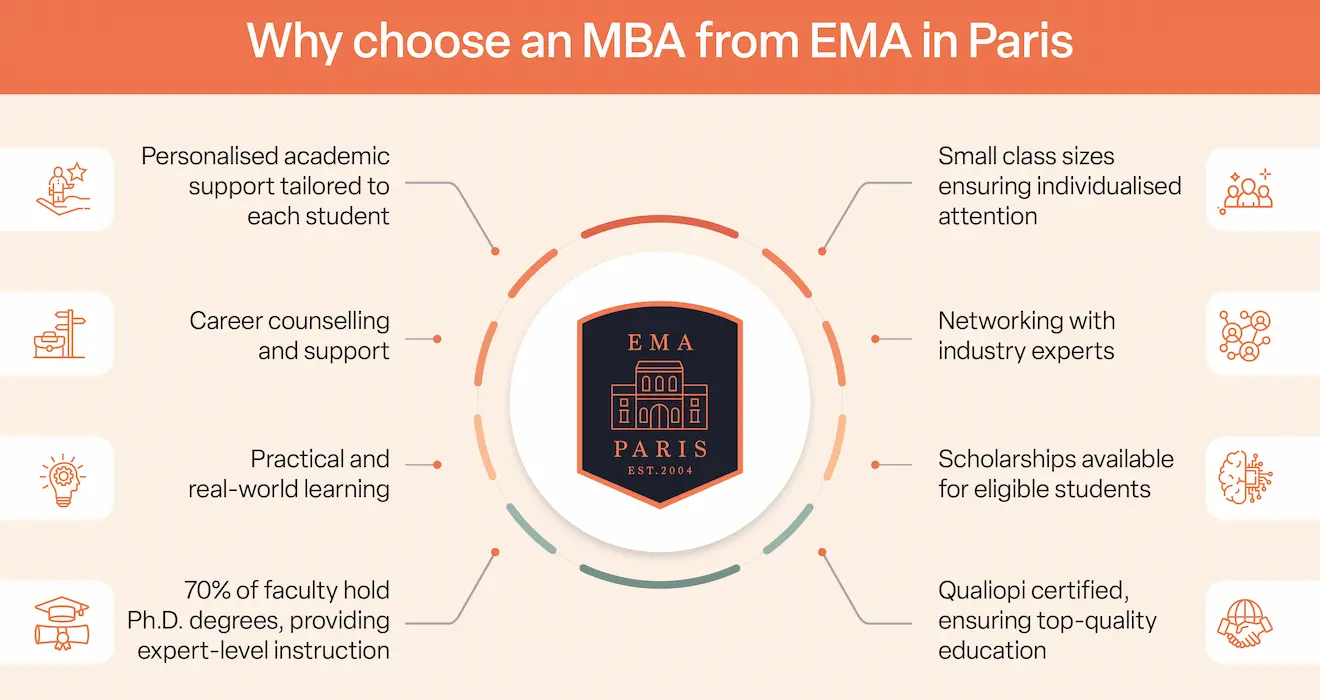No, that is very unlikely to happen unless you start your own business. While having an MBA degree is not a prerequisite for becoming a CEO, it is often preferred. However, becoming a CEO also depends on various other factors such as industry experience, networking and leadership skills.
Names like Alex Gorsky (Johnson & Johnson), James Dimon (JPMorgan Chase), Satya Narayana Nadella (Microsoft) and Tim Cook (Apple Inc.) are some of the popular names in the business world. They are well-known global business leaders who have had a profound impact on many industries. Yet these industry titans all have one thing in common: each pursued an MBA on their path to the top. But does this mean an MBA is your guaranteed golden ticket to becoming a CEO?
Becoming a CEO of a reputable company depends on numerous factors, but yes, your education and experience definitely play a role. While an MBA degree is not mandatory for every CEO position, around 30% of Fortune 500 CEOs do hold the degree. Your education is an important building block for a successful career but becoming CEO depends on various factors. These include leadership skills, strategic vision, adaptability and more. In this blog, we will explore how to become a CEO and the role an MBA degree can play in your leadership journey. From developing leadership skills in MBA programmes to leveraging your career after an MBA, we will outline the pathway that can help you join the ranks of the world’s most successful CEOs.
Who is a CEO?
Many people confuse a CEO with a company founder. While the same person may hold both positions in many organisations, their profile is different. A CEO is responsible for managing a company's crucial decisions and is among the highest-ranking executives. He acts as the public face of the organisation, making major corporate decisions and managing the company’s operations.
In general, the CEO reports to the board of directors and is accountable for company performance. The role involves setting the vision, overseeing other executives’ work and representing the company to investors and the public.
Essential skills for aspiring CEOs
As the head of an organisation, certain key qualities can significantly boost a CEO’s chances of success. A strong mix of hard and soft skills allows CEOs to inspire others, gain influence and rally their teams around their vision. To reach the top, you will need more than just technical knowledge. Successful CEOs possess the following key personality traits and skills:
| Skills | Description |
| Leadership skills | Ability to guide, inspire and motivate teams, setting the tone for organisational success. |
|
Creativity and innovation |
Capacity to think outside the box, drive new ideas and foster growth. |
|
Communication abilities |
Clear and persuasive communication to align teams and stakeholders. |
| Strategic vision | Seeing the big picture and setting a clear direction for the organisation. |
|
Resilience and stress management |
Handling high-pressure situations and maintaining composure under stress. |
|
Teamwork and collaboration |
Building trust and working effectively with others to achieve shared goals. |
|
Understanding of business |
Comprehensive knowledge of business operations, finance, and industry trends. |
While technical expertise is important, it is these essential skills and traits – from leadership and communication to business acumen and resilience – that truly distinguish successful CEOs. Developing these qualities will prepare you to deal with executive leadership challenges and drive your organisation forward.
How to become the CEO of the company
Becoming a CEO is a tough journey, even for the most experienced professionals. However, most CEOs follow a similar path: gaining the right skills, leading teams and showing they can think big and drive results. Following are some of the common steps to becoming a CEO and successfully leading a company:
1. Attain a relevant degree:
The first step to becoming a CEO is gaining the right knowledge and skills. While having a graduate degree is paramount, pursuing an MBA can give you an extra edge. An MBA curriculum covers critical business disciplines like finance, strategy and marketing, giving you a broad understanding of how organisations function. The experience also exposes you to diverse perspectives and real-world business challenges, sharpening your problem-solving skills.
Additionally, business schools often offer access to alumni networks and industry leaders, which can be invaluable for future opportunities. An MBA from a reputable institution, such as École de Management Appliqué, Paris, provides the foundation and credibility needed to stand out. Personalised attention, career counselling, workshops, and other support services are of great benefit to MBA students and enable them to climb the corporate ladder more easily.

2. Gain management experience:
Start with entry-level management roles and work your way up, taking on increasing responsibility. Seek roles that allow you to manage teams, oversee projects and make decisions that impact the organisation’s bottom line. Demonstrating consistent results and a willingness to take on new challenges will help you build a successful track record. Over time, these experiences will prepare you for executive leadership complexities and demands.
3. Develop leadership skills:
Seek out leadership opportunities, whether through projects, mentoring or professional development. Actively participate in cross-functional initiatives or volunteer to lead internal committees to broaden your skill set. Take advantage of leadership training programmes, workshops, or executive coaching to refine your ability to inspire and guide others.
Strong leaders are also great listeners, open to feedback and able to motivate diverse teams toward a common vision.
4. Build a strong network:
Business is all about connections. Leverage your MBA network and industry connections to advance in your career. Attend industry conferences, join professional associations and engage with mentors who can offer guidance and open doors. Cultivate relationships within and outside your organisation to stay informed about emerging trends and opportunities.
A strong network can provide support, advice and introductions that are crucial for career advancement.
5. Stay committed and adaptable:
Becoming a CEO takes time and ongoing effort. With an MBA degree, you learn to stay flexible, keep learning and adapt to change. Career after an MBA degree holds a lot of scope of growth professionally and well as personally. Stay curious, open to feedback and ready to grow. A strong mindset and a focus on personal and professional development are key to handling leadership challenges.
How an MBA helps you become a CEO

An MBA provides more than just business knowledge; it is a transformative experience that hones your leadership skills through MBA programmes. MBAs can help you set yourself up for a career as a CEO in the following ways:
- MBA programmes emphasise case studies and real-world scenarios, helping you think strategically and make informed decisions. This is one of the most important qualities of a prospective CEO.
- EMA, like other business schools, emphasises networking. You will connect with peers, professors and industry leaders, building relationships that can open doors to future opportunities.
- Through group projects, leadership workshops and mentorship, MBA programmes actively cultivate leadership qualities needed to inspire and motivate teams.
- An MBA curriculum covers finance, marketing, operations and more, giving you a holistic understanding of how businesses operate.
With the right training, an MBA becomes more than a degree. It becomes a launchpad to executive leadership. It equips you with the vision, confidence and connections needed to lead from the top
Career after an MBA: What opportunities await?
An MBA opens the doors to a wide range of opportunities, from entry-level management roles to executive positions. Graduates will find themselves well-equipped to take on leadership roles in finance, marketing, operations and strategy. These are also some of the key areas that form the backbone of any successful CEO’s experience. Career after an MBA trajectory involves progressively responsible positions, allowing you to build the experience and credibility needed for top leadership.
Pursuing an MBA at École de Management Appliqué, Paris
A CEO’s journey is a marathon, not a sprint. An MBA provides the knowledge, skills and networking to help you climb the corporate ladder. By focusing on how to become a CEO, developing leadership, strategic thinking and business acumen, you can position yourself for success in any industry.
If you are serious about your career after an MBA and aspire to reach the C-suite, choosing the right MBA programme is important. With a focus on practical learning, global perspectives and strong industry connections, EMA's MBA programme aims to equip students with networks that accelerate their journey to CEO. This MBA programme is designed to nurture leadership skills in students.
FAQs regarding developing MBA skills
Q. Can I become a CEO immediately after an MBA?
Q. How long does it take to become CEO?
Generally, it takes a minimum of 10–15 years to become a CEO. However, the actual number of years may vary significantly depending on a variety of aspects, such as the industry, company size, qualifications and experience.
Q. Does the choice of an MBA programme matter for becoming a CEO?
Yes, the reputation and network of your MBA programme can matter. For example, MBA at EMA, Paris, offer global perspectives, industry connections and good reputation in the market. Thus, accelerating your journey to the C-suite.
Q. What are the main responsibilities of a CEO?
A CEO is responsible for setting the company’s vision, making major corporate decisions, managing overall operations and representing the organisation to stakeholders and the public.
Q. How does an MBA help in becoming a CEO?
An MBA helps provide a strong foundation for business management, strategic thinking and leadership development. It also offers valuable networking opportunities and exposure to real-world business challenges.

 Brochure
Brochure
 Apply Now
Apply Now